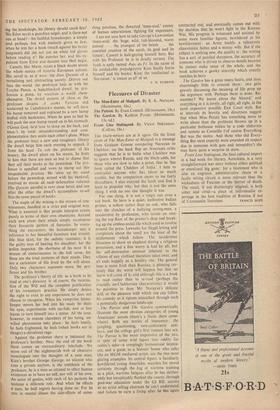Pleasures of Disaster
The Man-Eater of Malgudi. By R. K. Narayan. (Heinemann, 16s.) Front Line Stalingrad. By Victor Nekrassov. (Collins, I8s.)
THE blurb-writers are at it again. On the front cover of The Man-Eater of Malgudi is a message from Graham Greene comparing Narayan to Chekhov; on the back flap an American critic suggests that he is to India what Chekhov was to (guess where) Russia; and the blurb adds, for those who are slow to take a point, that he 'has been called the Chekhov of India.' I hate to contradict anyone who has taken so much trouble, but the comparison seems to me fairly threadbare; I also enjoyed the book and find it hard to pinpoint why, but that is not the same thing. I wish no one else thought it was.
For one thing, it is not a tragic nor even a sad book. Its hero is a quiet, ineffective Indian printer, a willow rather than an oak, who falls into the clutches of a bullying strong-man, a taxidermist by profession, who insists on rent- ing the top floor of the printer's shop and break- ing up the aimless social life which used to revolve around the press. Lawsuits for illegal letting and complaints about the smell are the least of the misfortunes which follow. The taxidermist threatens to shoot an elephant during a religious procession, and a fine worry is had by all; but the self-destructive element inherent in the villains of any civilised literature takes over, and all ends happily as a fertility rite. The general tone is more Irish than Russian, a pleasing cer- tainty that the worst will happen but that no harm will come of it; and although this is a book to read rather than to re-read (perhaps the crucially un-Chekhovian characteristic) it would he pointless to deny Mr. Narayan's delicate skill, or the pleasure with which one can follow his comedy as it tiptoes unscathed through such a potentially dangerous landscape.
The Patriot and The Garden symmetrically illustrate the most obvious categories of young Americans' novels (there's a thesis there some- where). Both are stories of innocence : the gangling, questioning, non-conformist anti- hero, and the college girl's first venture into sex. The Patriot is the more impressive of the two, in spite of some wild lapses into oddity for oddity's sake—a creepingly homosexual lieuten- ant, and a guide to a historic house who talks like an MGM mediaeval script, are the two most glaring examples. Its central figure, a familiarly bewildered young American, searches for moral certainty through the fog of wartime training as a pilot, wartime fatigues after he has deliber- ately but inexplicably flunked the course, through post-war education under the GI Bill, success as an artist selling abstracts he can't understand; and failure to earn a living after he has again
contracted out; and eventually conies out with the decision that he won't fight in the Korean War. His progress is witnessed and assisted by some more familiar figures, bewildered at his bewilderment: an Army buddy, a talkatively chauvinistic father and a mousy wife. But if the subject is nothing new, the quality is: the writing has a sort of puzzled sharpness, the accuracy of someone who is driven to observe details because he cannot make sense of the whole, and the book achieves a gawky sincerity which exactly matches its hero.
The Garden has a great many faults, and does disarmingly little to conceal them : two girls gravely discussing the meaning of life prop up the argument with 'Perhaps there is none. Re-
• member? We learnt about the Absurd,' and everything in it is lovely, all right, all right, in the most expensive possible East Coast style. But at intervals its brevity and directness suggest that when Miss Perutz has something more to write about than the problems thrown up in a particular hothouse milieu by a code elaborate and remote as Corneille ('of course Everything But was the motto And those who did Every- thing But most expertly were awarded all respect due to someone with guts and intrepidity') she may have quite a surprise in store.
Front Line Stalingrad, the final cultural import in a bad week for literary Autarkists, is a very straightforward war story without either political or emotional big guns: for a lieutenant who is also an engineer, administrative chaos or a faulty wiring circuit is more relevant than the wickedness of Fascism or the horror of death. The result, if not shatteringly original, is both sober and vivid—a piece of individualist re- portage in the best tradition of Russian if not of Communist literature. FRANCIS HOPE

































 Previous page
Previous page